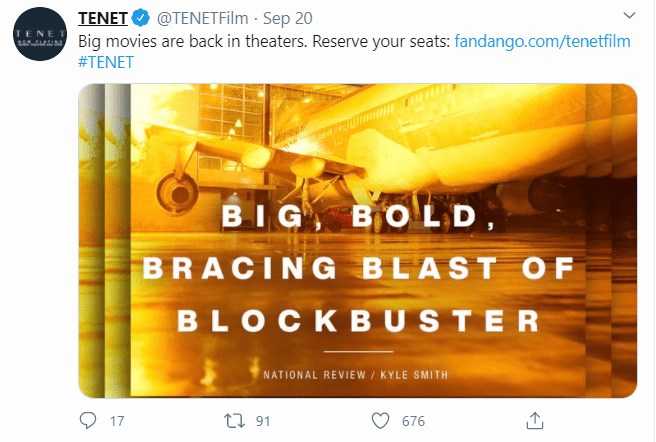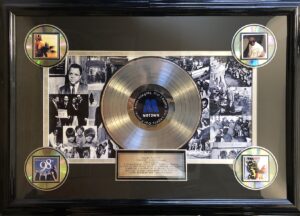5 PR lessons from ‘Tenet’
The new film from director Christopher Nolan offers communicators several takeaways as they navigate crises and more within their organizations.

Editor’s note: This article contains spoilers to the film.
Christopher Nolan’s “Tenet” is a film that bends viewers’ minds as much as its characters bend time.
Though the film has faltered at the box office due to the COVID-19 crisis, it’s gained a growing number of fans and continues to attract viewers with its captivating action scenes.
Consider these takeaways from the film and its release:
1. Be flexible, especially when taking risks.
“Tenet” was meant to be the film that coaxed United States consumers back into theaters, but reporters are saying Nolan’s effort hasn’t worked.
The time-bending sci-fi thriller generated $6.7 million in the U.S. and Canada during its second weekend of release, representing a 29% drop compared to opening weekend. Initially, Warner Bros., the studio behind “Tenet,” touted a $20 million debut. But a closer dissection of those numbers reveal they were heavily spun to include weekday preview screenings and the long holiday weekend. In reality, “Tenet” only made about $9 million between Friday and Sunday.
For Warner Bros., the news isn’t all bad since “Tenet” has performed admirably overseas. The film, which opened internationally in late August, has brought in more than $205 million globally so far. However, for domestic theaters, “Tenet’s” rough start puts a considerable strain on an industry that needed a blockbuster to entice moviegoers back to the cineplex.
With theaters in large markets such as Los Angeles remaining closed, social distancing measures in place and many consumers staying at home during COVID-19, bringing groups to cinemas is proving to be a tall task, and several studios have further pushed back their releases.
However, Warner Brothers has pointed to its promising international revenues and seems to be testing the waters for its release of “Wonder Woman 1984.” Other studios have seen success with digital only releases or by partnering with a streaming platform.
When taking risks, remain flexible and be prepared to change course if necessary.
2. Authenticity starts with following through on your words.
In the film, the main characters crash a 747 into an airport hangar. The impressive explosion isn’t the result of CGI or clever staging. Instead, the team crashed an actual 747 airplane into a building.
“I planned to do it using miniatures and set-piece builds and a combination of visual effects and all the rest,” Nolan tells TF. However, while scouting for locations in Victorville, California, the team discovered a massive array of old planes. “We started to run the numbers… It became apparent that it would actually be more efficient to buy a real plane of the real size, and perform this sequence for real in camera, rather than build miniatures or go the CG route.”
“In some cases, people want the real thing, something Nolan seems to understand,” CinemaBlend reported.
You can take this lesson to heart by following through on your commitments and promises, including your responses to the Black Lives Matter protests and COVID-19, as well as your goals for diversity and inclusion, sustainability and beyond.
When reporting to your stakeholders, outline your goals and what you’ve done to achieve them simply and straightforwardly. If you’re not reaching your goals or can’t give a transparent snapshot of your work, you should look at readjusting your goals as well as not overpromising, lest your words ring hollow.
3. Simplify complexity whenever possible.
If you thought “Inception” was complex, Nolan’s latest plot makes his earlier film look like child’s play. The story is made even more difficult to follow as the characters travel back and forth through time.
Regardless of how many viewings you see of “Tenet” to understand its plot and catch Nolan’s easter eggs, your campaigns and messages should not be anywhere close to this difficult to comprehend. It makes for an interesting cinematic experience, but not a good PR strategy.
Instead, translate jargon and complicated concepts such as engineering details in simple language that your audience can understand. Instruct your organization’s experts and executives to do the same, and coach them to speak in easy-to-understand ways through media training.
4. Your organization’s mission requires a team of experts.
Just as the epic missions in “Tenet” required a team of highly talented experts, so does your organization’s mission and vision.
For communicators, that means nurturing a diverse and inclusive company culture that attracts and retains top talent. It also means developing an understanding your workforce as well as your business objectives. You can tap into your employees’ behaviors and thoughts through surveys and other feedback channels. Remember that younger generations want to be connected to organizations’ purposes and values more than previous generations, so you might have to shift your strategies.
5. You can’t go back in time to fix mistakes.
The Protagonist is only one of several characters who travel back in time to either stop an event from happening or encourage something to take place, so the team can ultimately thwart the antagonist Sator’s evil plans.
Your PR campaigns and executive slip-ups can’t be erased through an inverted timeline, but you can use your failures to avoid future missteps or adjust campaigns to get back on track.
Even in a film where characters can time travel, there are certain things that can’t be undone. In PR terms, your reputation won’t recover if you’re caught hiding the truth. Once trust is destroyed, it can be very hard to nearly impossible to fix.
6. Become your story’s protagonist.
Just as The Protagonist had to realize his name and role in the mission, you too must rise to the occasion to help your organization succeed.
Instead of being a communicator who understands business strategy, strive to become a businessperson who is an outstanding communicator. Doing so can help you gain buy-in and grab a seat at the decision-making table.
What PR lessons or parallels did you see in “Tenet?” Share your takeaways in the comments.







